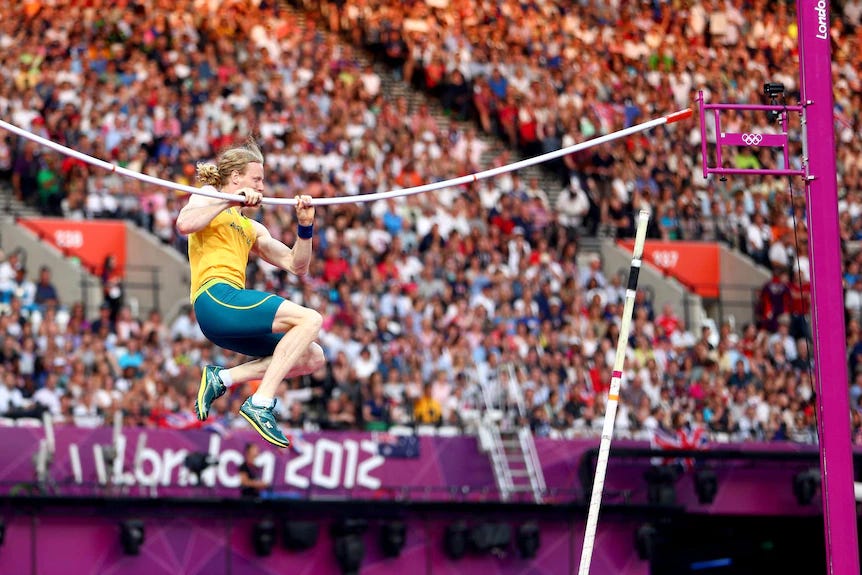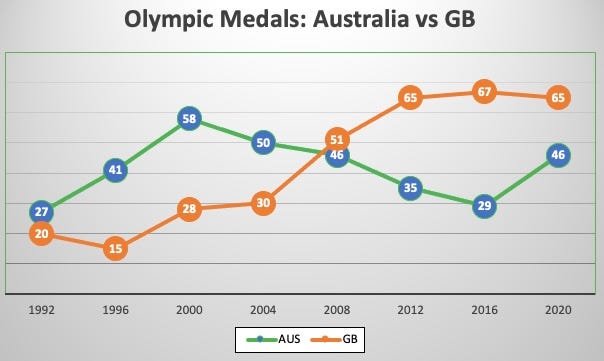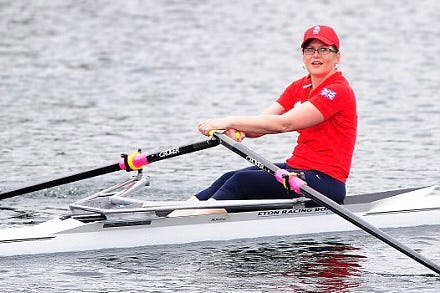What have the Australians ever done for us? Monty Python would struggle for a list of sporting gifts to match the Romans’ sanitation, medicine, roads etc., especially in the middle of the current Ashes drubbing. But with the tenth anniversary of London 2012 only six months away, let’s not forget that it was the Aussies who taught us how to win.
This is an anniversary that looks like slipping past unnoticed. The sporting calendar is especially crowded in 2022, and the home Commonwealth Games in Birmingham will trump distant memories of London’s Olympic & Paralympic summer. The CWG opening ceremony is ten years and one day after London’s.
I’ve heard a few desultory rumours of anniversary events in the Queen Elizabeth Olympic Park, but no-one seems fired with any enthusiasm. After all, there is little sporting legacy for Britain to crow about in the Park itself. West Ham has its stadium and the velodrome, aquatics and hockey centres have staged international competitions, but athletics is slipping from sight and would-be renters of the various venues tend to find the costs prohibitive.
Best not dig too deeply into the effect of London 2012 on the nation’s sporting habits either. Inspiration did not give way to perspiration. Sport England’s regular surveys of activity levels show them flatlining. We don’t know, of course, if they would have been lower in the absence of hosting the Games. Perhaps the deluge of Team GB medals has shored up Britons’ crumbling propensity to jump off the sofa and exercise.
What Britain’s athletes have done, however, is keep winning. Sports Minister Hugh Robertson’s 2012 bet about Olympic medals with his Australian counterpart looks a steal with hindsight. The Brits won almost double the number of Aussie medals and Kate Lundy completed her forfeit of a 1000m row at Eton Dorney in Team GB colours.
But at Sydney 2000 the relative outcome had been almost exactly the reverse. Australia jumped from tenth in the medal table in 1992 to fourth at home. It lost the habit in London and Rio but climbed back to sixth last year in Tokyo. Britain was tenth in Sydney but has finished in the top four in each of the past three Games.
UK Sport made no secret of learning from the Australian funding system and medal factory once London secured hosting rights for the Olympics in 2005. It augmented its analysis with recruitment of Aussie talent into Britain’s high performance system.
This brain drain was helped by Australia temporarily dulling its medal ambitions after the success of retaining its ranking at Athens, four years after Sydney. Post Olympics lesson #1 is redouble your efforts if you want to avoid going backwards.
I enjoyed appearing in the BBC’s Gold Rush series last year looking back at London 2012. It gave me the chance to reminisce about Super Saturday, wax lyrical about the greatest athlete of my time at UK Athletics - Christine Ohuruogu - and climb on my soapbox once again to bang on about the flaws inherent in UK Sport’s no compromise approach to the pursuit of medals.
The standout interviewee in the series for me was cyclist Victoria Pendleton, who gave raw testimony about the very real risks to the mental health of athletes of Britain’s lottery funding system.
“I spent days in the Olympic Village watching the tiny television thinking ‘wow, wow, wow, I don’t want to be the only one that doesn’t win a medal’. You very much feel like a machine, rather than a living, breathing human being with feelings and emotions, which I very much am.” Victoria Pendleton in BBC’s Gold Rush
Watching Pendleton took me back to a vivid memory of my time in the Olympic Stadium a decade ago. Not of British medals or near misses, but of the heartbreaking sight of Australian Steve Hooker comprehensively failing in the defence of his Olympic pole vault title.
Hooker went into London suffering a loss of confidence in his technique akin to that of gymnast Simone Biles in Tokyo last year. Think for a moment about being upside down at the end of a flexible pole six metres off the ground. He spoke about his “auto-pilot not working” but being desperate to retain his crown.
The Aussie vaulter qualified for the final in London but then was one of two athletes who failed to register a height in three attempts. It was hard to watch. He competed four times in Australia the next year and bowed out from athletics by running a 200m race for his local club in 2014.
“I honestly thought the body would be the one that would give way, and that would be the end. But it has almost been the opposite.” Steve Hooker on his retirement
So by all means publish medal targets to focus efforts, urge the public to buy lottery tickets, remind athletes to thank those lottery players every time they step off the track, paint postboxes gold to celebrate winners. And do be grateful to Australia for showing us how. But count the human costs honestly as you dream your dreams of Games past and Games yet to come.
Watch BBC’s Gold Rush series here
Saints for a song
Chinese money has given way to Serbian at Southampton FC. The price of the club’s sale to Dragan Solak’s Sport Republic is undisclosed, although Sky reported it as £100m for an 80% stake. If true this is further evidence - following the Newcastle sale and West Ham’s Czech investment - that the real value of Premier League clubs outside the so-called ‘big six’ is less heady than many assume.
Add in an outstanding debt of around £80m, and the enterprise value of Southampton is almost certainly less than it would cost to build their St Mary’s Stadium all over again from scratch. The departing Gao Jisheng appears to have halved his money in under five years.
The problem of course is the constant risk of relegation, and with it financial ruin, for the majority of EPL clubs. Southampton have typically finished mid-table in their current ten year run in the top flight, but can never start a season completely confident of avoiding the drop.
Clubs end up being run at a loss, year after year, as owners sink money into their squads in the dog-fight to stay up - a stark reminder that you should never buy any investment asset without having a clear and credible exit strategy.
And talking of Newcastle United…
The magic of the cup
Newcastle Utd (turnover £153m) - 0
Cambridge Utd (turnover est. £6m) - 1
Delighted to have swerved the U’s in the 4th round draw!
Sarnies at the ready
If you’re at a loose end at 2pm on 18th January, do join me virtually to discuss building a career in sports governance at iSportLearn’s Lunchtime Learning event.
Here’s the registration link: Lunchtime Learning









Enjoying the read Ed, and looking forward to more Australian themed analysis of the Ashes/Novak Djokovic stories. Steve